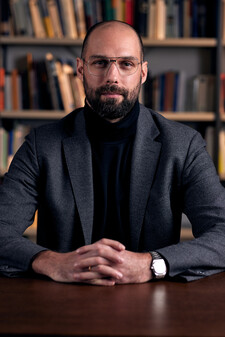
Biography
Born 1983 in Friesach, Dr. phil, Mag. phil.
Studied history and various other disciplines in Vienna, 2018 PhD at the University of Vienna. 2017-2020 University Assistant for Philosophy of Science and Comparative Media History at the Department of History of the University of Vienna, 2019 Visiting Lecturer at the Humboldt University of Berlin, 2019 Visiting Scholar at the University of Chicago, 2020-2022 Research Associate at the Chair of Cultural and Media History at the University of Saarland, Summer term 2021 Chair Substitute there. Since 2022 research associate at the institute of Culture Studies.
Current of Sciences and head of the research project "The construction of the Austrian ‘Trümmerfrau’" (FWF).
Main research interests:
Contemporary history of the three successor societies of the Nazi state, conspiracy theories and anti-science since the 19th century, cultural history and popular culture of the 20th and 21st century, digital history, philosophy of science.
Monographs (2)
Monographs (2)
Die Konstruktion nationaler Identität und Alterität in den drei Nachfolgegesellschaften des NS-Staates, Wiesbaden 2020.
(together with Thomas Walach and Stefan Zahlmann), Geschichtstheorie, Wiesbaden 2019.
Editions (3)
Editions (3)
(together with Thomas Walach), Brennpunkte. Interviews zu den Lebenswelten von Kindern in Wien, Wien 2017.
Medienkulturen des Sports, Wien 2016.
(together with Thomas Walach), The Simpsons did it! Postmodernity in Yellow, Wien 2014.
Series-Editions
Series-Editions
Geschichte des Digitalen Zeitalters, Springer VS/Wiesbaden.
Articles (18)
Articles (18)
Bill Gates, Impfungen und die New World Order. Verschwörungstheorien zu Covid-19 in Sozialen Medien. In: Arno Görgen / Tobias Eichinger / Eugen Pfister (eds.): Superspreader – Popkultur und mediale Diskurse im Angesicht der Pandemie. (177-192) Bielefeld: transcript Verlag 2024. Open Access
The Other as Conspirator.Historical Roots of COVID-19 Conspiracy Theories. In: Heike Steinhoff (ed.): Epidemics and Othering (119-138). Bielefeld: transcript Verlag 2023.
(together with Marcella Tambuscio) “#schleichdiduoaschloch” Terror, Collective Memory, and Social Media. In: Social Media + Society, 9(3)/2023.
(together with Eugen Pfister), “Ranke ex machina? Geschichtstheorie in digitalen Spielen”, in: Geschichte in Wissenschaft und Unterricht, 3-4/2023, 125-139.
‘Did my grandfather storm the beaches of Normandy for this shit?’ Mnemonic wars and digital games. Memory Studies, 15(6)/2022, 1532–1543.
(together with Thomas Walach), Trümmerfrauen – Mythos und blinder Fleck der österreichischen Zeitgeschichte. Vierteljahreshefte für Zeitgeschichte 2/2022.
Die Hyperrealität des Videospiels. Überlegungen eines Historikers zum Leitmedium unserer Zeit. In: Stefan Zahlmann (Ed.): Die Wirklichkeit der Steine 2. Wien et al 2021.
Hin und wieder Österreich. Cordoba und die österreichische Identität. In: Stefan Zahlmann (ed.): Die Wirklichkeit der Steine 3. Wien et al 2021.
Significant Otherness—Constructing a National Identity in Post-War Austria. In: Nations and Nationalism. 2021; 27.
When Worlds Collide - Taboos and the Second World War in Digital Games. In: GAME Journal 9/2020 (together with Eugen Pfister).
Fighting truth with facts - An essay on public history and conspiracy theories. In: Public History Weekly 9/2020.
Who owns the ‘Trümmerfrauen’? In: Public History Weekly 9/2019.
Orks sind auch nur Menschen. In: Karin Felten et al (ed.): Forschungsdrang & Rollenspiel : motivgeschichtliche Betrachtungen zum Fantasy-Rollenspiel "Das Schwarze Auge". Waldems 2019.
Wir und die Anderen. Die Konstruktion nationaler Identität in der Sportberichterstattung der drei Nachfolgegesellschaften des NS-Staats in den 1950er Jahren. In: Matthias Marschik, Agnes Meisinger, Rudolf Müllner, Hannes Skocek, Georg Spitaler (eds.): Images des Sports in Österreich. Vienna 2018.
(together with Thomas Walach), Fake News – Geschichte und Gegenwart eines Medienphänomens. In: Historische Sozialkunde 3/2018.
Oral History als Methode forschenden Lernens. Eine Einführung. In: Martin Tschiggerl, Thomas Walach (eds.): Brennpunkte. Interviews zu Lebenswelten von Kindern in Wien. Vienna 2017.
Semiotik als Zauberei – Die Macht der Sprache in Patrick Rothfuss Königsmörder-Chronik. In: Paul Ferstl, Thomas Walach, Stefan Zahlmann (eds.): Fantasy Studies. Vienna 2016.
Parteiische Neutralität. Österreichische Sportberichterstattung im Kalten Krieg. In: Zeitgeschichte 4/15.
Popular science articles (selection)
Popular science articles (selection)
Verschwörungstheorien: Angst essen Verstand auf, Der Standard, 20.5.2020.
Causa Höbelt: Die Farce nach der Tragödie, Der Standard, 20.1.2020.
Hände weg vom Haus der Geschichte, FALTER 49/18.
Austrofaschismus – der verschwiegene Faschismus in Österreich, Der Standard, 16.11.2018.
"You are fake news!": Geschichte eines Medienphänomens, Der Standard, 19.12.2017.
Reviews
Reviews
Julia Timpe, and Frederike Buda, eds. Writing the Digital History of Nazi Germany: Potentialities and Challenges of Digitally Researching and Presenting the History of the Third Reich, World War II, and the Holocaust Berlin: De Gruyter, 2022. Pp. 231. Austrian History Yearbook. Published online 2023:1-2. doi
History in Games. WerkstattGeschichte, 30(86) 2022, 155-158. doi